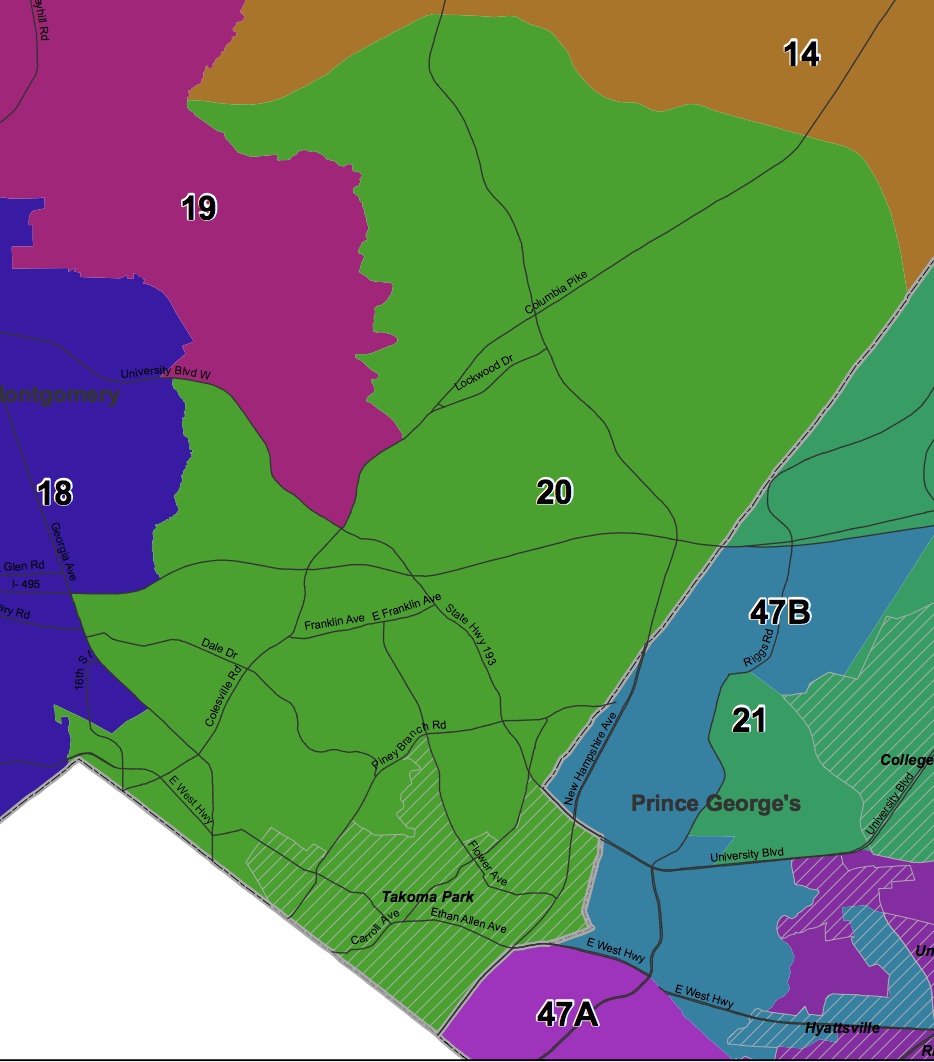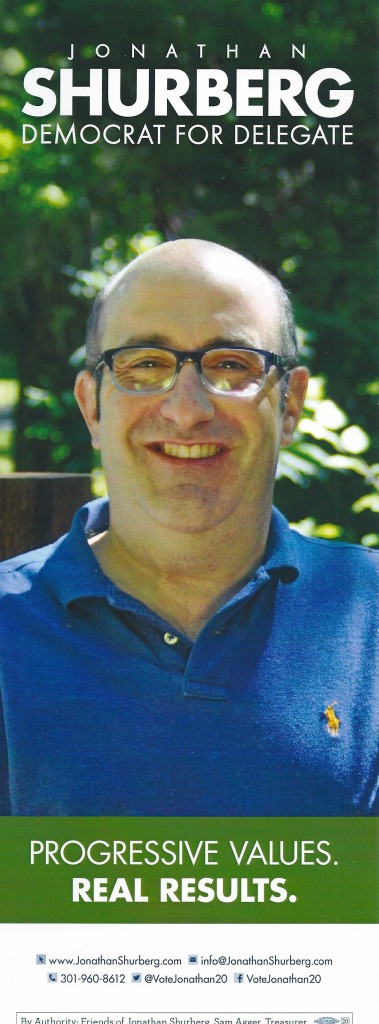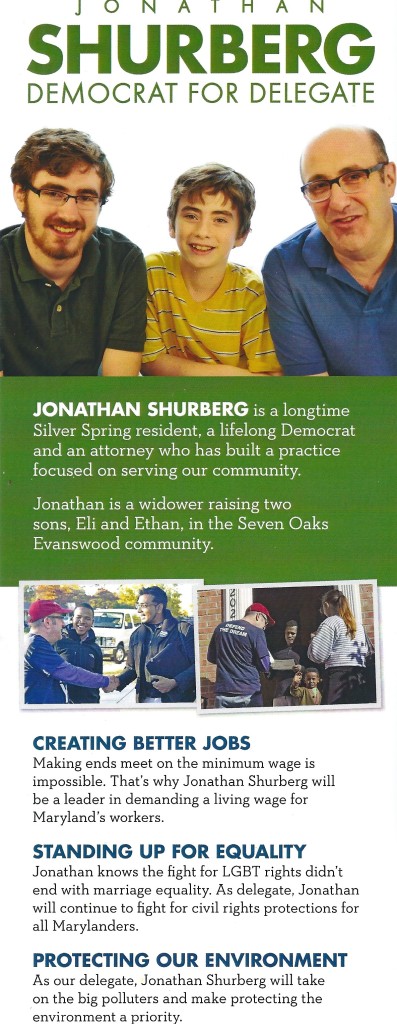Tag Archives: Jonathan Shurberg
D20 Delegate Race Analysis

District 20’s two open seat primary for Delegate is possibly the most talked about state legislative primary in Maryland this year. The large field has settled into a four candidate top tier.
First, there is David Moon–a long time political operative, well-read state politics blogger and attorney. He has received endorsements from MCEA and the LCV. He had over $50,000 on hand for his January Report. His progressive politics fit the district well and he is presently the best bet to capture one of the two open seats. He has the best, most professionally run campaign of the bunch.
Then there is Will Jawando–a federal lobbyist, former Capitol Hill staffer and Obama appointee. He is also an attorney. Jawando had raised over $40,000 by January. While his fundraising has drastically underperformed expectations, he still has more non self-financed money than anyone else in the race. His lack of local ties and infrastructure hurts him with some activists. But precinct chairs make up a tiny percentage of Democratic primary voters, which many people seem to forget sometimes.
There is also Will Smith, an attorney, Homeland Security consultant and Obama appointee. He has a strong resume and has gotten endorsements from MCEA, the LCV and the Sierra Club. Smith has burned half of his $52,000 haul, leaving him with a paltry $28,000 cash on hand. This high burn rate is the sign of a badly mismanaged campaign. In the year before an election, candidates should be conserving their cash in order to maximize spending on paid communications in the weeks leading up to Election Day. From fundraising to field to communications to political, I have yet to hear anything positive about Will’s operation.
Rounding out the top tier is Jonathan Shurberg, a trial lawyer dogged by substantial ethical issues. His law license was (until recently) suspended over misappropriation of client funds. He has had multiple tax liens against his properties and has been sued for legal malpractice. Nevertheless, Shurberg does have access to substantial sums of money (my spies tell me they spring from a family oil and gas fortune). However, the campaign has burned through half of the initial $125,000 he loaned his campaign. Shurberg has three people on his staff–insane for a Maryland legislative race. He also has a litany of consultants on the payroll–some credible, some dubious. Lots of money has also gone to event sponsorships and other activities that do little to communicate his message to voters. The campaign has gotten universally bad reviews around the county. His ethical baggage and burn rate would normally doom his campaign. But if he keeps writing himself the checks, it’s possible he can pull it off.
There are a variety of other candidates: D’Juan Hopewell (an anti hunger advocate), Justin Chappell (a former Tom Harkin staffer and disability rights activist), Darian Unger (Howard University academic, volunteer firefighter and civic activist) and George Zokle (a litigation attorney). All would be threats in other districts but it would require a real shake up for any of them to break through in D20 on June 24th.
Sheila Hixson is a lock for reelection.
Ratings: Safe Hixson, Lean Moon, and Toss Up between Shurberg, Jawando and Smith for the third seat.
Note: Organization of a slate by popular Sen. Jamie Raskin and Del. Sheila Hixson could scramble these ratings.
Push Polls in District 20?
 Three of the District 20 Delegate Candidates: David Moon, Will Smith, and Jonathan Shurberg
Three of the District 20 Delegate Candidates: David Moon, Will Smith, and Jonathan Shurberg
District 20 has a lively delegate race with two vacancies caused by Del. Heather Mizeur’s gubernatorial run and Del. Tom Hucker’s county council candidacy. Local lawyer and Democratic activist Jonathan Shurberg is a candidate.
Jon has already loaned his campaign $125K and is rumored to be prepared to loan far more if needed to win the seat in his first run for elective office. Even in Montgomery County, he will clearly break towards the very high end of spending if he follows through and loans his campaign similar amounts in the future.
Rumors started earlier this week that Jon was the victim of a push poll when voters started receiving calls asking questions about Shurberg’s past three tax liens and previous disbarment, actually suspension, from the practice of law in Maryland (see also here and here) due to having misappropriated client funds. The poll also asked for responses to positive statements about his opponents.
Some speculated that David Moon or Will Smith–two other candidates in the race–had possibly sponsored the poll to undermine Jon’s campaign. Both know quite a bit about campaigns, especially in District 20. David ran Jamie Raskin’s 2006 campaign, has worked extensively as a campaign consultant, and is the author of the Maryland Juice blog, Will Smith, a former Obama appointee in the Department of Homeland Security, ran the D20 slate’s successful reelection campaign in 2010.
However, I could not imagine savvy, experienced campaign consultants like either David or Will carrying out a push poll because it just wouldn’t make much sense in this case.
First, the multi-seat nature of delegate races offers little incentive to go negative. When campaigning in these sorts of races, it’s best to be on friendly terms with everyone. If you meet a voter who says they like a rival candidate, it makes it easier to respond “she’s great, I hope you’ll vote for me too!” Attacking another candidate mainly risks losing votes from their supporters.
Second, there is no guarantee that it will benefit the ad’s sponsor, particularly in a race with so many candidates. Instead, it may aid another candidate, especially when the target denounces the ad as scurrilous and its sponsor as throwing mud. Finally, polling is costly and the money would be better spent on voter contact.
So who did the poll?
Turns out Jon did the poll to test out the impact of potential attacks and positive messages that other candidates may use.
Not a good use of campaign funds. Money is a very helpful campaign resource but only if it is spent wisely. Polling results are often dubious in down ballot races with so many candidates. Name recognition of the candidates is low. Voters respond as much to cues from endorsers as much as message.
One can test messages but it hardly requires a poll to know that voters will be suspicious of an attorney threatened with disbarment. Moreover, it’s working to counter a message that will likely never be used. Better to have spent the money on voter contact instead of exposing voters to negative information about his past.


